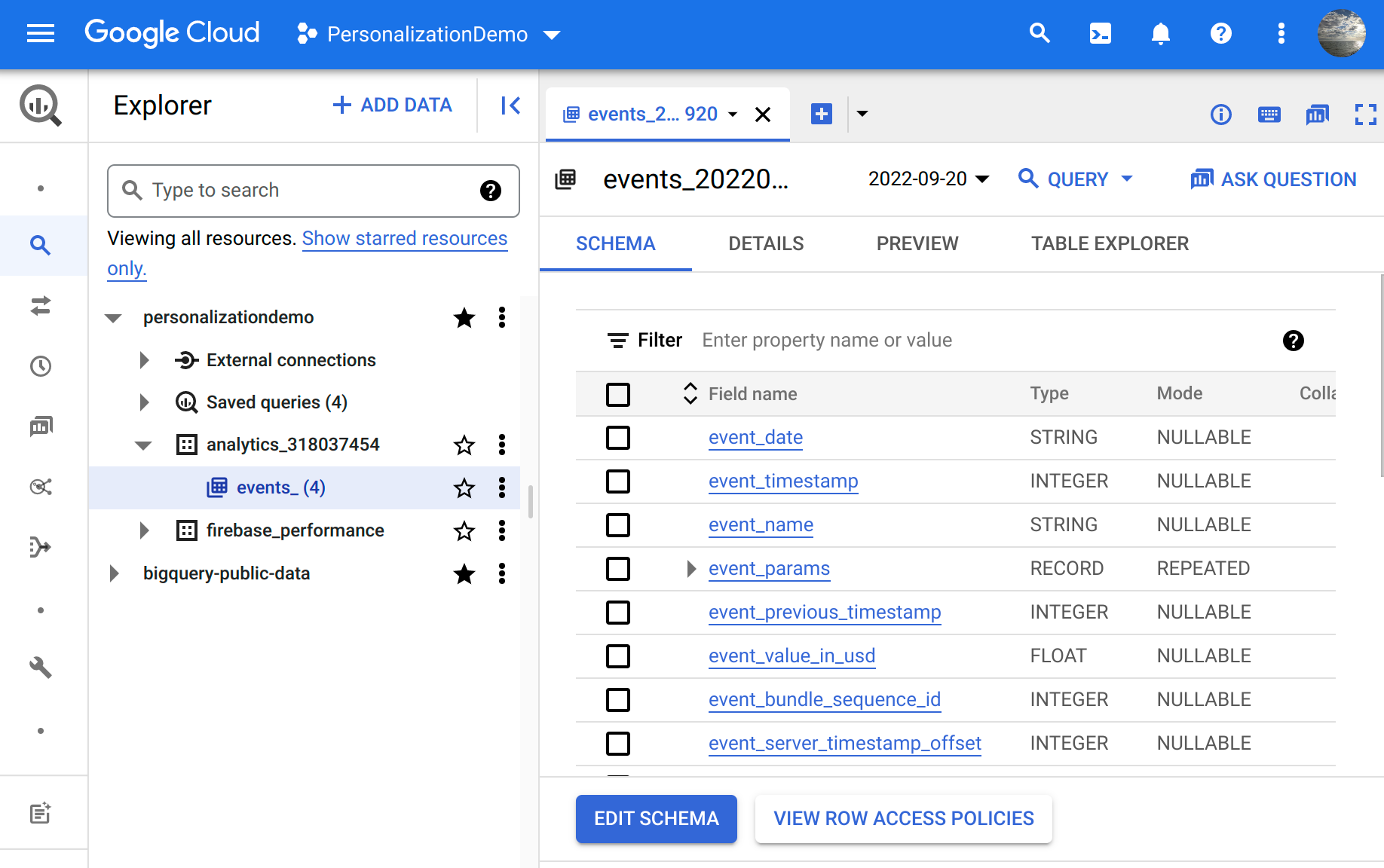Remote Config personalization logs a personalization_assignment
Analytics event when a personalization is assigned to a user, allowing you
to use BigQuery to inspect and
analyze personalization events and associated events.
The following sections describe how to enable BigQuery export for Analytics events, how personalization events are stored, and provide some basic queries to get you started.
Enable BigQuery export for Google Analytics for Firebase
If you're on the Spark plan, you can use the BigQuery sandbox to access BigQuery at no cost, subject to Sandbox limits. See Pricing and the BigQuery sandbox for more information.
First, make sure that you’re exporting your Analytics data to BigQuery:
- Open the Integrations tab, which you can access using > Project settings in the Firebase console.
- If you're already using BigQuery with other Firebase services, click Manage. Otherwise, click Link.
- Review About Linking Firebase to BigQuery, then click Next.
- In the Configure integration section, enable the Google Analytics toggle.
Select a region and choose export settings.
Click Link to BigQuery.
Depending on how you chose to export data, it may take up to a day for the tables to become available. For more information about exporting project data to BigQuery, see Export project data to BigQuery.
Next, let’s access and inspect our personalization events in BigQuery.
Access Remote Config personalization data using BigQuery
To query analytics data for an experiment:
- Open BigQuery in the Google Cloud console. You can also open it directly from Analytics Events using the view your raw events in BigQuery link at the bottom of the page.
Select your Firebase project and expand it, then expand the
analytics_ANALYTICS_PROPERTY_IDentry and clickevents_.
From the Query drop-down, select In a new tab.
An auto-generated example query appears.
To view personalization events and associated data, update the query to select
personalization_assignmentevents. The following example query will return a complete personalization assignment event for a specific date shard, limiting results to 10:# Select all personalization_assignment events SELECT * FROM `PROJECT_NAME.analytics_ANALYTICS_PROPERTY_ID.events_DATE_SHARD` WHERE event_name = 'personalization_assignment' LIMIT 10Tip: To search all event tables instead of the sharded table, you can replace the events table date with an asterisk (for example,
PROJECT_NAME.analytics_ANALYTICS_PROPERTY_ID.events_*). This is not recommended in non-test scenarios or for large data sets.In the query composer, select Run query. Results appear in the lower pane.
In the next section, we'll discuss what’s included in a personalization assignment event in more detail.
What personalization data is exported to BigQuery?
Personalization data is included in Google Analytics tables in
BigQuery and stored in personalization_assignment events.
The basic fields provided in a personalization event are the same as any
Analytics event as described in
[GA4] BigQuery Export schema.
You’ll be mostly concerned with user_pseudo_id i(which can be used to
differentiate distinct users), event timestamps, and other user properties.
Personalization-specific details are stored in the event_params field and are
described in the following table:
| Parameter | Data type | Description |
|---|---|---|
| personalization_id | STRING | Provides the assigned personalization's universally unique identifier (UUID). |
| group | STRING | Indicates whether the user was assigned to the personalization group (P13N) or the baseline (BASELINE) group. |
| arm_index | INTEGER | Represents the alternative value assigned to the user, an integer between 0 and 4. |
| arm_key | STRING | Contains the parameter name used by the personalization. |
| arm_value | STRING | Contains the alternative value string assigned by personalization. |
| engaged_session_event | INTEGER | Includes the number of sessions the user is engaged in. See About sessions for more information. |
| firebase_event_origin | STRING | Indicates the origin of the event. This will always be fp
for personalization_assignment events.
|
| firebase_screen_class | STRING | Provides the class name of the screen on which the user was active when the personalization assignment occurred. See Automatically collected events for more information. |
| firebase_screen_id | INTEGER | Displays the ID of the screen the user was on when the personalization assignment occurred. See Automatically collected events for more information. |
| first_open_time | STRING | Provides the timestamp, in UTC milliseconds, of the first time the user opened the app. See Automatically collected events for more information. |
| ga_session_id | INTEGER | Provides the Google Analytics session ID. See
About
sessions for more information. You can use this to correlate the
personalization_assignment event with other Analytics events.
|
| ga_session_number | INTEGER | Provides the Google Analytics session number. See About sessions for more information. |
Example queries
You can use a SQL statement like the following to extract the
personalization-specific parameters from personalization_assignment events:
# Expand nested personalization parameters
SELECT
timestamp_micros(event_timestamp) AS event_time,
user_pseudo_id,
(
SELECT event_params.value.string_value
FROM UNNEST(event_params) event_params
WHERE event_params.key = 'group'
) AS personalization_group,
(
SELECT event_params.value.string_value
FROM UNNEST(event_params) event_params
WHERE event_params.key = 'personalization_id'
) AS personalization_id,
(
SELECT event_params.value.string_value,
FROM UNNEST(event_params) event_params
WHERE event_params.key = 'arm_key'
) AS arm_key,
(
SELECT event_params.value.string_value
FROM UNNEST(event_params) event_params
WHERE event_params.key = 'arm_value'
) AS arm_value,
(
SELECT event_params.value.int_value
FROM UNNEST(event_params) event_params
WHERE event_params.key = 'ga_session_id'
) AS ga_session_id,
FROM `PROJECT_NAME.analytics_ANALYTICS_ACCOUNT_ID.events_DATE_SHARD`
WHERE event_name = 'personalization_assignment'
LIMIT 10
